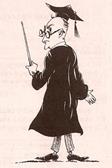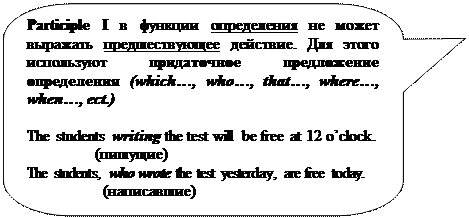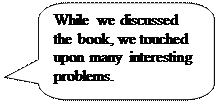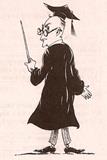5. When you come late to classes you say something about your watch being slow, don't you?
6. When your group mate complains to you of her bad toothache, you insist on her going to the dentist's, don't you?
7. Do you appreciate having a good holiday after the year's work?
Exercise 28. Complete the following using predicative constructions with the gerund.
 |
1. You don't seem to mind their...
2. What is the reason of his...?
3. I don't understand what prevents her...
4. There's no sense in your...
5. She finished her...
6. He dropped the subject without my...
7. He liked the idea of their...
8. They saved time by Tom's...
9. There was no excuse for Isabel's...
10. I sat there listening to Arthur...
11. I don't like her...
12. He was right in his...
13. There is no point in my...
14. Forgive my...
Exercise 29. Translate into English:
1. Спасибо, что вы просмотрели за моим багажом.
2. Я могу похвастаться, что мой сын поступил в институт.
3. Я против того, чтобы сдавать наши вещи в багаж.
4. Он сожалел, что его друзья не попали на этот матч.
5. Я доволен, что наша команда сравняла счет.
6. Я настаиваю на том, чтобы ему дали возможность пересдать экзамен.
7. Я предлагаю, чтобы ты сходил в аптеку.
8. Все зависит от того, выиграют ли они этот матч.
9. Я была уверена, что он сдержит своё обещание.
10. Ты не возражаешь, если я буду с тобой откровенна?
11. По-моему, нет никакой необходимости рекламировать эти товары.
12. Я удивлена, что доктор не прописал тебе этого лекарства.
13. Мне не нравится, что он связался с этими людьми. Это плохая компания.
 |
 |
Герундий или инфинитив
Exercise 30. Read these sentences. Pay attention to the difference in meaning of gerunds and infinities.

|
1. Remember to lend the book to him.
2. I don't remember lending this book to anyone.
3. Will you stop listening to the radio, please?
4. He stopped to say "good-bye" to us.
5. Your daughter likes swimming, doesn't she?
6. "Would you like to have a swim before lunch?" "Yes, I'd love to."
7. "He hates getting up early." "So do I."
8. I'd hate to spend a night in the woods.
9. I'd like to feel independent.
10. Children like playing more than studying.
11. I meant to buy an evening paper but I didn't see anyone sell them.
12. "I want to catch the 7 a.m. train tomorrow." "But that means getting up at 6".
13. I regret being unable to help you.
14. I regret to tell you that I failed.
15. The librarian didn't allow (permit) us to talk here.
16. The librarian doesn't allow (permit) talking here.
Exercise 31. Open the brackets. Use either gerunds or infinitives.



 Student A: Student B:
Student A: Student B:
1. "Let's go for a swim." "I'm not particularly good at (to swim). What about (to go) for a drive instead?"
2. "Do you feel like (to dine) out or would you rather (to have) dinner at home?" "I'd like (to go) out. I always enjoy (to have) dinner in a restaurant."
3. "I don't mind (to travel) by bus, but I hate (to stand) in queues." "I don't like (to queue) either, and you waste so much time waiting for buses. I think it's better (to go) by underground."
4. "Would you like (to come) to a lecture on Beethoven tonight?" "No, thanks. I like (to listen) to music but I don't like (to listen) to people talking about it."
5. "All right. When would you like (to start)?" "In a few minutes." "Let's wait till it stops (to rain); otherwise we'll get wet walking to the bus station."
6. "Do you remember (to meet) him at my house last year?" "Yes, certainly. I shall never forget (to meet) him. He's a wonderful man."
Exercise 32. Use infinitives or gerunds in the correct form:

|
1. What must you remember (do) before leaving home?
2. I regret (remind) him about his debt.
3. Don't tell me the secret. I prefer not (know) it.
4. Do you remember (take) to the art gallery for the first time?
5. He went on (say) something, but we couldn't hear him because of the noise.
6. “We expect the administration to take a decision”, the speaker went on (say).
7. I can't tell her the truth. I'm afraid (upset) her.
8. The old lady forgot (put on) her glasses.
9. She hardly ever took a bus to the station, she preferred (walk).
10. Don't forget (take) your swimming suit.
11. The girl was afraid (come) near the dog, because she was afraid (bite).
12. I need (find) him urgently.
13. The parents regretted (allow) their daughter to stay out late.
14. He realized she would stand on her rights and stopped (argue).
15. Your hair is too long. It needs (cut).
16. They meant (be) on time but had to stop several times (ask) the way.
17. I try hard (master) spoken English but I find it difficult. - Try (watch) English video films and (listen) to tape stories.
18. It seemed so exciting to stay at the sea coast a few more days, but it would mean (return) by plane, and he hated (fly).
19. If you intend (catch) the bus it means (leave) now.
20. I remember my father (tell) me (respect) my friends’ opinion.
21. Remember (lock) the door for the night before (go) to bed.
22. She was afraid (say) a word, for she was afraid (wake) up the parents.
С. The Participle
Exercise 1. Comment on the tense and voice form of the participles. Translate the sentences into Russian.

|
1. Looking round she saw several pictures which were remarkably good.
2. Being run down and depressed, he went out to have a walk.
3. Being written by a famous writer, the book drew my attention.
4. Not having been signed by the director, the document was of no value.
5. Being written in a hurry the letter was illegible.
6. Being furnished in good taste the flat looked very elegant.
Exercise 2. Put ‘ why ’-questions to the following statements. Let your fellow-students respond to them.
Mоdel: For a moment they stood smiling at each other.



 Student A: Student B:
Student A: Student B:
1. When listening tо her I had an impression that something worried her.
2. In half an hour my friend, looking at his watch, announced that he must go.
3. Taking her handkerchief she hid her face in it.
4. Jim went out slamming the door.
5. "Why did you invite Bill?" Ann asked, reddening.
6. The boy clenched his hands, trying to pull himself together.
7. He looked at me smiling nervously.
8. He stood quite still for a moment peering around.
9. The boy rushed to his mother crying bitterly.
10. They walked slowly enjoying the quiet evening.
Exercise 3. Complete the sentences using participial constructions from the list below.
1. I remained in the garden...
2. She came into the kitchen…
3. He shook my hand...
4. Suddenly she rose and went to the front door...
5. He held out his hand…
6. I could not help laughing...
7. He left the room…
8. He laughed merrily...
9. He got up...
10. He grasped her hand...
| smiling happily; enjoying the wonderful day; having nothing more to say; putting on her apron; while reading the story; turning to his sister; fancying that she heard a knock; feeling that the interview was over; advancing towards me; shutting the door behind him |
Exercise 4. Complete the sentences. Make use of the phrases in brackets.

|
1. She expected her sister to be grateful. (to sacrifice everything for her sake)
2. The mother tried to sooth the child. (to kiss and take him in her arms)
3. Geese and turkeys were putting on weight quickly. (to feed well)
4. Her brother’s family also arrived. (to inform about the wedding)
5. She was quite breathless. (to run up two flights of stairs)
6. He saw the Westminster Palace on his left. (to turn round)
7. The man can’t control his temper. (to make fun of him)
8. They know each other quite well. (to be at school together)
9. They recollected their days at the college. (to talk over a cup of tea)
10. He found the text he needed. (to turn over three or four pages)
Exercise 5. Transform these sentences according to the models.
a) The girl who is talking to Mr. Brown is our guide.
The girl talking to Mr. Brown is our guide.
1. The young man who is standing at the window is their new teacher.
2. The figure skaters who are dancing now won the first prize last year.
3. His book of poems that they published last year is very popular.
4. The treaty that was concluded last month is of great importance.
5. The girl who is greeting us is my elder sister
b) After he had done his homework he went for a walk.
Having done his homework, he went for a walk.
1. After he had returned from abroad he continued his University studies.
2. After she had failed to win the first prize in the championship she wept.
3. After he had completed the work he left for a holiday.
4. After she had won the gold medal a third time she decided to give up skiing.
5. After he had bought a present he took a taxi and went to the railway station.
c) When they arrived at the airport they saw their friends.
Arriving at the airport they saw their friends.
1. When she was going downstairs she saw Peter in the hall.
2. When she opened the door she saw a stranger.
3. When she closed the door she went upstairs.
4. When he was asked what he thought of the film he said he liked it.
5. When we listened to him we burst out laughing.
d) As Mary was very tired she didn't help her brother with his homework.
Being very tired Mary didn't help her brother with his homework.
1. As he felt hot and feverish he decided to take his temperature.
2. She smiled as she remembered the story.
3. As he didn't know what to do he decided to phone his father.
4. As he was informed about the accident he arrived at the place immediately.
5. As he looked out of the window he saw a crowd of people.
Exercise 6. Translate what is given in brackets using Participle I. Pay attention to the form of Participle I.

|
1. She came into the kitchen, (вытирая руки передником).
2. I went out into the garden and remained there, (наблюдая за бурей).
3. Lucy and Rose entered the train together, (улыбаясь друг другу).
4. (Увидев, что я не пью чай) she brought a cup of coffee.
5. "Tea," I said, (поставив большую белую чашку перед ним).
6. Snow was falling now in soft, large flakes, (покрывая красные крыши).
7. I looked at the girl who was sitting at the window, (читая книгу).
8. "That's odd," he said, (хмурясь).
9. (Вернувшись в свой номер), I opened a book and began reading it.
10. Henry, (услышав шум), came into the room.
Exercise 7. Paraphrase the following.



 Student A: Student B:
Student A: Student B:
1. As the meat was well cooked it tasted delicious.
2. As the man had drunk a lot of wine he couldn’t drive.
3. When he went down the stairs he was humming a tune softly.
4. The man was ruined because he had stuck to cards.
5. As I realized that he was a dishonest person, I decided to break off with him.
6. When I filled in the form I handed it over to the cashier.
7. As she was promised presents for Christmas she was looking forward to it.
8. As she was bored to death by his company she found an excuse and left.
9. As the boys were allowed to watch the match they didn't go to bed in time.
10. As they were paid in advance they had the money for the railway fare.
 |

Exercise 8. Change the following using either Participle I or an attributive clause.
1. The tapestry was hanging on the wall. It attracted everybody's attention.
2. The woman who's standing at the notice board works at the Dean's office.
3. The drawings that have won the first places will be sent to the exhibition.
4. What's the name of the teacher who told us about her trip to London last week?
5. Look at the boy who's making a snowman. How rosy his cheeks are!
6. The woman over there who's wearing a silk head square is my aunt.
7. The car that was standing at the gate was won in the lottery.
Exercise 9. Complete the sentences using Participle I and an attributive clause:
 |
Do you know the girl…?
1. (to run ahead of the others)
2. (to win the first prize at the competition in track and field)
3. (to play the part of Ofelia in yesterday’s performance)
4. (to sit in the second row behind Pete)
5. (to leave us a message at the dean’s office)
6. (to smile at you cheerfully)
7. (to speak in favour of your suggestion)
Exercise 10. Translate into English:
1. Я благодарна врачам, спасшим жизнь моего ребенка.
2. Студенты, читающие много английских книг, знают язык очень хорошо.
3. Что можно сказать о человеке, не сдержавшем своего слова?
4. Студенты, выступавшие вчера на собрании, говорили об учебе.
5. Он упал, никем не замеченный.
6. Я попросил незнакомца, сидевшего рядом со мной, помочь мне.
7. Я спросил у человека, читавшего газету, который час.
8. Книги, взятые в библиотеке, нужно возвратить через неделю.
9. Велосипеды, выпускаемые этим заводом, пользуются большим спросом.
10. Книги, напечатанные в прошлом месяце, уже поступили в продажу.
11. Упакованные вещи стояли в коридоре.
Exercise 11. Paraphrase the following sentences using the Participle where possible.



 Student A: Student B:
Student A: Student B:
1. As he was a great book lover, he spent a lot of money on books.
2. The answer I got from my friend worried me greatly.
3. As I thought it would rain, I took my raincoat with me.
4. I heard that he was coming up the stairs slowly.
5. As Petrov was very much excited he didn't hear the teacher's questions.
6. When I arrived at the station I found out that I had left my ticket at home.
7. As she was pretty sensible she was able to come to a compromise.
Exercise 12. Make up sentences using the following constructions with Participle I in the function of an adverbial modifier.

|
1. working regularly;
2. looking at his watch;
3. disapproving of her behavior;
4. wishing to get home in time;
5. enjoying the evening;
6. laughing and singing;
7. not seeing;
8.  having quarreled;
having quarreled;
9. smiling at one another;
10. not knowing;
11. jumping up from her seat;
12. glancing up at the clock;
13. while skating;
14. when speaking about his books
 |
Exercise 13. Paraphrase:



 Student A: Student B:
Student A: Student B:
1. When he was running he fell down and injured his leg.
2. While the hockey player was sitting in the penalty box he watched the game.
3. When Helen was a student she lived in a hostel.
4. While they were at the theatre, they were talking about art.
5. While the doctor was examining the girl he saw that she was feverish.
6. While they were discussing the problem they tried to find a settlement.
7. When he was a child he was fond of playing football.
Exercise 14. Respond to the following.

|
1. Where did you find this photo? (to look through one's old letters)
2. Where did you buy this wonderful booklet? (to roam about the museum)
3. How did you get to know him? (to play football for our Institute team)
4. Where did you find this mushroom? (to walk in the wood)
5. How did she manage to pass the exam? (to be very industrious and clever)
Exercise 15. Complete the sentences. Supply a natural conversational context.
1. Hearing her steps...
2. Waiting for the others to come...
3. When a boy, he...
4. Seeing me...
5. Having lost my umbrella...
6. Being a lover of nature....
7. When exploring London...
8. Pretending not to recognize me...
9. Being in charge of the children...
10. When examining the patient...
11. While listening to the lecturer...
12. Being pressed for time...
13. Arriving at the airport...
14. When reading the book...
Exercise 16. Translate into English:
1. Он хорошо знал английский, т. к. прожил и Англии десять лет.
2. Он посещал все концерты, будучи любителем классической музыки.
3. Будучи в Лондоне, они осмотрели достопримечательности города.
4. Будучи застенчивым, он не вымолвил ни слова в течение всего вечера.
5. Не зная, какую шляпу выбрать, она обратилась к продавщице за советом.
6. Хорошо зная его, я не могла доверить ему это ответственное дело.
7. Переселившись на новую квартиру, они устроили новоселье.
8. Подогрев обед в микроволновой печи, они сели за стол.
9. Потратив все деньги на мелочи, ей пришлось занимать еще денег.
Exercise 17. Change the following sentences using Participle I or II where possible:
1. After she had sent the children to a resort, she relaxed a bit.
2. When the tourists were in Scotland, they were struck by its beauty.
3. The forests which give a good supply of timber are of great value.
4. The trees which are being planted now, have been brought from other countries.
5. The boys who arrived at the lake yesterday are putting up tents now.
6. We were struck by the climate contrasts of the country.
7. Though the valley was not lit by the sun it looked astonishing.
8. As we had been shown the way to the cliffs, we were the first to start off.
9. He leaned against the fence and looked at the trees.
10. They stopped as they didn't know what path to choose.
Exercise 18. Replace the infinitives in the brackets by Participle I or II:

|
1. When (to ask) to show the countries (to situate) on the British Isles, he did it.
2. (to be) only 22 miles from France, the cliffs of Britain are often seen in France.
3. (to come) to the coast, they understood how picturesque the scenery was.
4. The port (to build) on the river some years ago is used for small vessels.
5. The canal (to build) now will be used for ships.
6. (to be) away so many years, he was happy to be coming back.
7. (to sleep) two hours, I felt refreshed and rested.
8. (to complete) all our preparations, we started off early in the morning.
9. He wanted his house (to value) at £800.
10. For hours he used to watch the sheep (to wander) on the hills.
Exercise 19. Translate into English.
1. Успешно сдав все экзамены, студенты решили работать летом гидами.
2. Войдя в класс, учительница увидела десятки глаз, глядящих на нее.
3. Играя в шахматы, он обычно посмеивался над своими партнерами.
4. Уложив чемоданы и захватив собаку, они отправились вниз по Темзе.
5. Прочитав несколько страниц, девочка отложила книгу.
6. Проходя мимо этого дома вчера, я слышала, как кто-то прекрасно пел.
7. Подходя к дому, мать увидела, что дети ждут ее, стоя у калитки.
8. Видя, что Чарли в отчаянии, мать всячески старалась успокоить его.
9. Услышав чьи-то шаги и голоса, мы спрятались за деревом.
10. Проходя мимо, я увидел свет в окне и решил заглянуть к вам.
 |
 |
Exercise 20. Paraphrase the following using objective predicative constructions with Participle I.



 Student A: Student B:
Student A: Student B:
1. She was watching him (he, not to see).
2. Someone was shouting (I, to hear).
3. The water was sucking at the piles beneath the house (they, to hear).
4. My cheeks were going red (I, to feel).
5. His ears were glowing (he, to feel).
6. The gardeners were watering beds of young lettuce (he, to watch).
7. My sister was signaling to me from another table (I, to see).
8. His father was moving around in the living room (he, to hear).
9. He was waiting about five minutes (they, to keep).
10. They were sitting in the sunshine (she, to find).
Exercise 21. Complete the following so as to use objective predicative constructions with Participle I.

|
1. They watched the children....
2. He didn't see her....
3. I didn't notice you....
4. I've never heard you....
5. I didn't see anybody....
6. The girl saw someone....
7. The blow sent the boy....
8. She watched the car....
9. She heard the footsteps....
10. I saw the door....
11. She heard the children....
12. He felt her....
Exercise 22. Recast the following sentences so as to use objective predicative constructions with Participle I.
Make the sentences passive.



 Student A: Student B:
Student A: Student B:
1. I saw that a small crowd was collecting, attracted by the fire.
2. I felt that they were doing something useful.
3. He saw that Martha was cutting the plum cake that she had made.
4. When I opened my eyes I saw the others were still sleeping.
5. I noticed that Jane was sitting close to Freddy.
6. I could see that Dave was still standing in the door-way.
7. He saw that Arthur was looking at the boat.
8. He could see that a man was standing on the pavement, facing the doors.
9. When he opened the window he heard how the birds were singing in the garden.
10. I could feel that the room was rocking under my feet.
Exercise 23. Choose the correct form (Infinitive without to or –ing form) of the verbs:



 Student A: Student B:
Student A: Student B:






